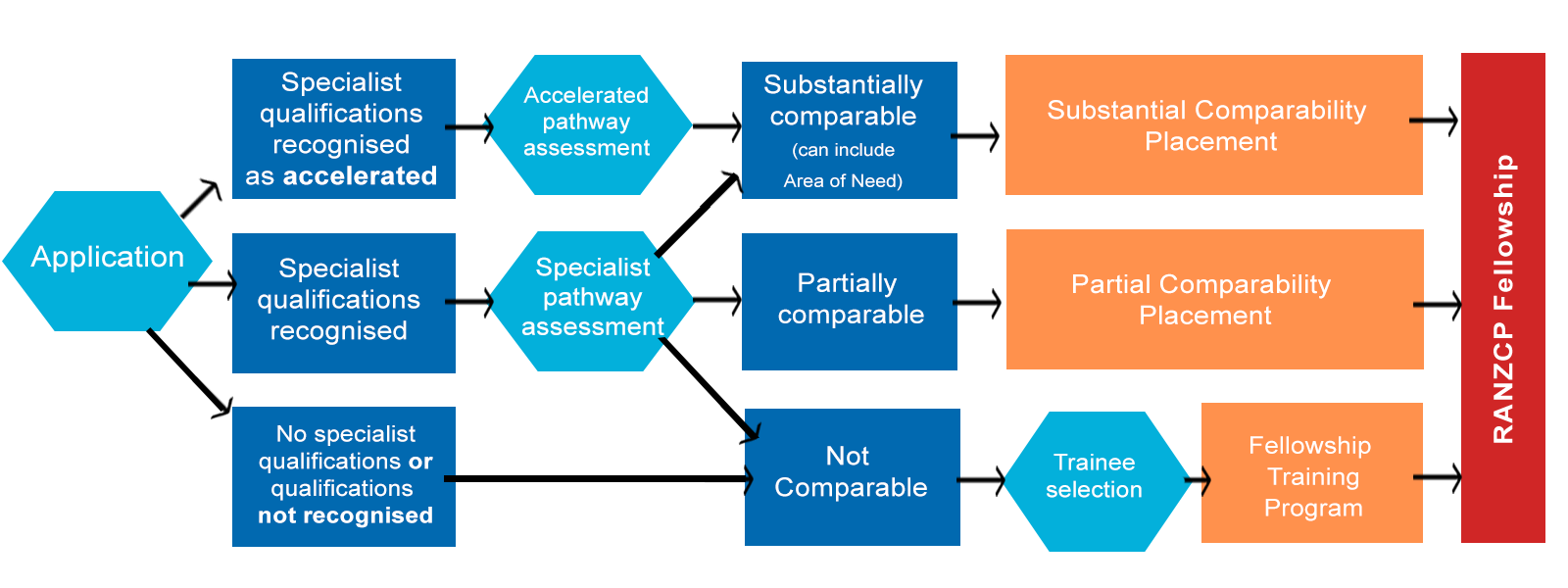Specialist assessment
Specialist assessment is a pathway for international specialists to gain Fellowship of the RANZCP in Australia and Aotearoa New Zealand.
The specialist assessment:
- is for international specialist psychiatrists only
- reviews your qualifications as compared to a RANZCP Fellow
- has essential eligibility criteria
- checks if you qualify for an accelerated pathway
- attracts fees
- has three possible outcomes – substantially, partially or not comparable.
The flowchart below outlines the application process and possible pathways to RANZCP Fellowship.

Eligibility criteria
Highest psychiatry qualification available in your home country
You must hold the highest qualification in clinical psychiatry attainable in the country of qualification at the time of qualification. Your qualification must enable registration for practice as a specialist psychiatrist in that country.
Your qualification must also:
- have been obtained through training under supervision
- be of least three (3) years in duration
- include at least 12 months general adult training, of which six (6) months was acute in-patient.
The MRCPsych with CESR may meet eligibility criteria in limited circumstances. This is considered on a case-by-case basis.
AMC Primary Source Verification
You must have primary source verification of your primary and specialist psychiatry qualifications from the Australian Medical Council (AMC).
Evidence of English language proficiency
You may need to provide evidence of English language proficiency. Please refer to Ahpra for more information about English language registration standards.
Specialist registration in home country
You must have attained registration as a specialist psychiatrist in your home country.
Self-assessment
Use this self-assessment checklist as a tool to determine the comparability of your training, experience and qualifications.
- SIMG comparability self-assessment checklist [PDF; 213 KB]
This is a self-assessment tool only. It should only be used as a guide to help you with the application process and does not constitute the final eligibility of the assessment outcome.
Job offer requirement
You do not need to have a job offer to apply for specialist assessment with RANZCP.
However, you do need to have a confirmed job offer in order to start your placement after receiving the outcome from your specialist assessment.
Application fees
All applicants must pay an administration fee of A/NZ$525 at the time of application.
If your application is incomplete, an additional administration fee of A/NZ$262 may be charged.
Fees if you do not qualify for the accelerated pathway
You will need to pay A/NZ$6812 to continue with the specialist assessment. This fee covers your interview and full documentation review. You will be invoiced once your application is found to be complete.
Begin the specialist assessment process by completing the online form.
Assessment process
The entire assessment process can take up to 18 weeks from the date your completed application is received. For applicants who qualify as accelerated, this process is much shorter.
1. Application
You will be asked to provide your contact details, ID verification, AMC number and information about your specialist qualifications.
2. Initial review
Your answers will be reviewed to determine whether you:
- are eligible for specialist assessment
- qualify for the accelerated pathway
If you are eligible for specialist assessment, but don’t hold the relevant qualifications for the accelerated pathway, you will be provided with next steps to continue with specialist assessment, as outlined below.
If you are not eligible for the accelerated pathway
1. Provide additional evidence to continue with specialist assessment
This checklist outlines the additional evidence of your qualifications and experience you will need to provide.
- SIMG application checklist [PDF; 121 KB]
2. Proceed to National Assessment Panel review
Your entire application including all details of your qualifications and experience is reviewed by the National Assessment Panel and compared to Australian standards.
The review uses a uniform assessment framework that considers:
- training standards, quality of training and supervision
- accreditation standards
- health and mental health standards and systems
- experience at a consultant psychiatrist
- recognition of further learning.
Panel reviews are completed in rounds, on set dates throughout the year.
3. Summary of Preliminary Review (SPR) letter
Once your application has been reviewed by the National Assessment Panel, you will receive a Summary of Preliminary Review (SPR) letter containing a detailed response to your application, and information about an interview if you are invited to one.
4. Interview
You may be invited to attend an interview. Interviews are conducted online via Zoom, on one day during the assessment round.
You will be informed of your interview date and time 21 days after the panel completes their initial assessment. We recommend that you keep this period free of other commitments until you are notified of your interview date. Interview dates and times cannot be changed and are based on the availability of the National Assessment Panel.
Assessment outcome
There are three possible outcomes of the specialist assessment process:
- Substantially comparable
- Partially comparable
- Not comparable
If you are found to be not comparable, you may choose to apply for the RANZCP Fellowship Program. This is a separate application process with its own dates, fees, eligibility rules and selection criteria.
There is also the opportunity to appeal a decision, according to the RANZCP Appeals process.
College membership
When you start your Partial Comparability or Substantial Comparability placement with RANZCP, you automatically become an Associate Member of the College.
